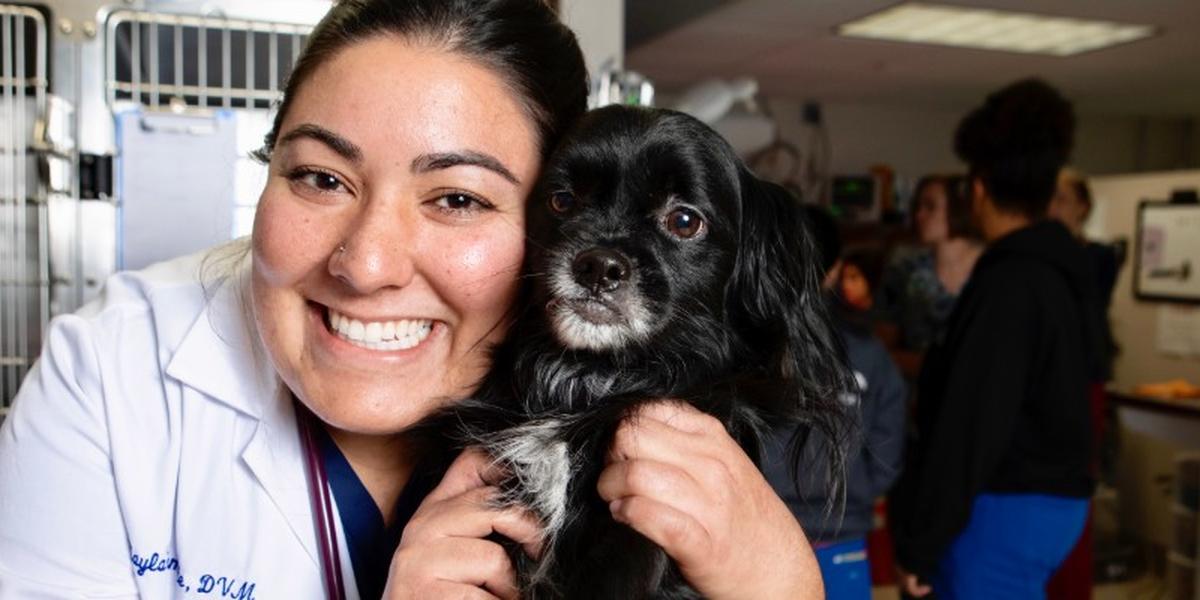"The best doctor I can be"
Kayla Sample, ’18 DVM, takes her passion for community medicine to the East Coast

Kayla Sample, ’18 DVM, takes her passion for community medicine to the East Coast
Kayla Sample and her dog, Rocko
There’s a story Kayla Sample, ’18 DVM, likes to tell from her undergraduate years that exemplifies the power of community veterinary medicine. Sample was volunteering with a student-run free veterinary clinic when she met a homeless woman, “Dee,” and Dee’s dog Buddy.
“She had been a lawyer, with a comfortable middle-class life. Her dog, Buddy, had been with her a long time. She’d gotten [injured] in some way, and was unable to work. Her husband had died, and she ended up losing her home,” Sample recalls.
“She was so thankful; she was in tears thanking us for helping Buddy and allowing her to keep him. I was so humbled by what it meant to her.”
Today, Sample is the veterinary medical director at the Monty Tech Veterinary Clinic in Fitchburg, Mass. She always knew she wanted to be a veterinarian; her very first spoken word was her childhood dog’s name: Hoop. And Sample may have been – starting at age 8 – one of the youngest Guide Dogs of America puppy raisers ever. But that time with Dee and Buddy, during her undergrad career at UC Davis, crystallized for Sample the kind of medicine she hoped to practice.
Four fulfilling years at the University of Minnesota’s College of Veterinary Medicine (CVM) affirmed that vision. At first, winter threw her for a loop: the San Diego native remembers her first visit to Minnesota, in which she declined to wear a hat to her admissions interview (“I didn’t want hat hair!”) and spent part of the conversation rubbing her frozen ears. But Sample’s passion for devoting her knowledge and time to underserved communities was cemented here.
Sample enjoyed numerous opportunities to explore community veterinary medicine outside the classroom. She worked with programs like Veterinary Treatment Outreach for Urban Community Health (VeTouch), the CVM’s student-run organization that provides pet care and nutritional support to low- and no-income Twin Cities families, and the Student Initiative for Reservation Veterinary Services (SIRVS), which works with tribal communities across Minnesota to provide pet care on reservations.
Collaborating with these communities at once helps pets and their owners receive veterinary care that is otherwise hard to access, while also giving CVM students the opportunity to hone their clinical and interpersonal skills. It’s a win-win that improves the field of veterinary medicine in more ways than one.
“I’m very proud that I went to the University of Minnesota,” Sample says. “Because of the University, I was uniquely prepared to continue on this path. Those community outreach programs reminded me why my learning in the classroom mattered – why I care.” Helping people who face barriers in accessing veterinary care keep their beloved companion animals healthy is, to Sample, challenging but endlessly rewarding.
“Our profession is becoming more aware of what it’s like to have a pet during financial uncertainty,” Sample continues. The people at most risk of losing their dogs or cats due to food or housing insecurity and trauma are, in some ways, the people who benefit most from the human-animal bond. “We have so much literature now about how beneficial animals are for people. And we want to keep animals where they’re loved.”
There’s no profit motive for serving families without means, so preventive care is all the more essential. Sometimes Sample has to make tough choices in prioritizing diagnostic testing. She’s grateful for the various ways in which her practice at Monty Tech is subsidized, with some funding procured through grants. And the facility in which Sample works was built and outfitted by trade school students, whose education was enhanced in the process. “It’s pretty revolutionary,” she says.
Sample’s commitment to her practice includes ongoing study of Spanish on her own time, as her clientele includes many Spanish language speakers. “I’m by no means a perfectly fluent speaker, but I’m usually able to understand what people’s concerns are,” and to communicate on a basic level.
“Anything that’s getting in the way of somebody being able to take care of their pet – I want to be the best doctor I can be,” she says. “Every day, I keep growing.”